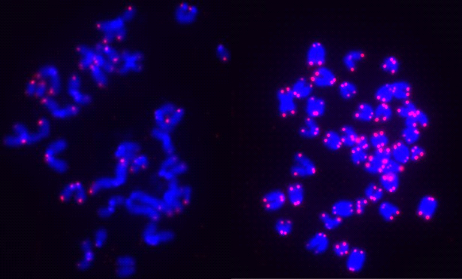News
Telomeres: More than just chromosomes caps!
Published on mai 21, 2020
Telomeres are particular DNA sequences at the end of chromosomes that serve as caps to protect against degradation, fraying, and fusion with other chromosomes. Long, intact telomeres are maintained by an enzyme called telomerase reverse transcriptase (TERT) and are essential for cell viability. As TERT expression and activity levels decrease with age, telomere erosion eventually leads to chromosome loss, rearrangements, and cell death or arrest.
Telomere dysfunction is also known to impair stem cell differentiation, and is associated with human disorders marked by depletion of stem cells. Surprisingly, recent discoveries indicate that defective cell differentiation may be due to abnormal epigenetic regulation in cells with eroded telomeres, but the functional links between telomere shortening and abnormal epigenetic regulation remains unclear.
The group led by Lea Harrington at IRIC, in collaboration with colleagues at the Princess Margaret Cancer Centre in Toronto, recently elucidated a piece of this puzzle and identified a molecular mechanism linking telomeres and epigenetic regulation. Their findings were just published in the journal eLife.
Compromised telomeres alter differentiation and gene expression
The researchers focused on mouse embryonic stem cells (mESCs) genetically modified to be TERT deficient (Tert-/-) and that display significantly shortened telomeres. They first demonstrated that when stimulated to differentiate into neuronal precursor cells, many Tert-/- cells were unable to become fully differentiated or to maintain the differentiated state. These cells continued to express genes typical of stem cells rather than differentiated cells.
A link with epigenetic regulation
The team then focused on a particular epigenetic modification, the “H3K27me3 repression mark”, known to affect the level of compaction of DNA and turn off “pluripotency” genes that would otherwise maintain cells in a stem cell-like, undifferentiated state. They showed that by inhibiting the enzymes that either add or remove this “repression mark”, using chemical inhibitors or genetic manipulations, they could modify the differentiation potential of Tert-/- cells. Reducing the level of H3K27me3 exacerbated the defect as pluripotency genes continued to be expressed, but conversely increasing the level of H3K27me3 partially alleviated the defect in differentiation as it turned down pluripotency genes.
Finally, the researchers asked whether Tert-/- cells displayed a global alteration in the accessibility of DNA and gene regulation, since it is known that global epigenetic remodeling is required for embryonic stem cell differentiation. The results show that Tert-/- cells indeed exhibit genome-wide perturbations in DNA accessibility and gene expression during differentiation and that these changes were accompanied by a modified H3K27me3 profile globally.
Perturbations in telomere integrity, and in the epigenetic regulation of gene expression, are known to occur with age or in certain cancers and identification of the functional links between them might reveal new opportunities in the management of age-associated diseases including cancer.
Referenced study:
Criqui M, Qamra A, Chu TW, Sharma M, Tsao J, Henry DA, Barsyte-Lovejoy D, Arrowsmith CH, Winegarden N, Lupien M, Harrington L.
Elife. 2020 Apr 16 ;9. pii: e47333
Short telomeres perturb the epigenetic landscape of murine embryonic stem cells and destabilize differentiation
Photos: Mélanie Criqui
